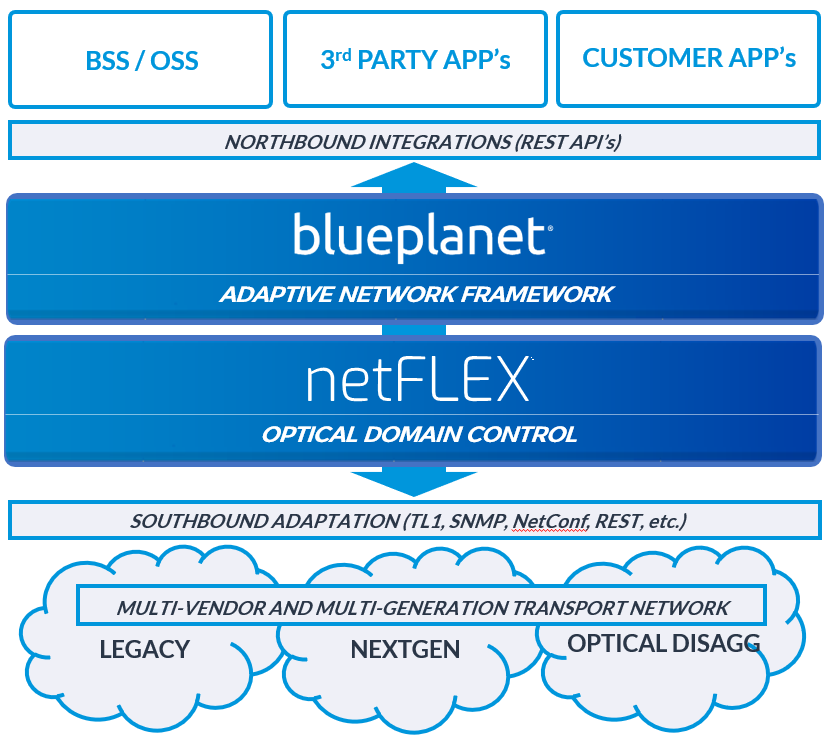Q&A with LightRiver Software COO Travis Ewert: Enhancing multi-vendor, multi-layer visibility and automation
As service providers race to add flexibility and automation to their network services, the multi-layer and multi-vendor realities of today’s complex network infrastructures become a barrier to progress. That’s where solution providers like LightRiver come into play. LightRiver, a long-time technology and delivery partner of Ciena and Blue Planet, is an expert in packet optical transport networks and designs, engineers, commissions, and supports next generation, software controlled, transport networks. As a multi-vendor integrator of next-generation transport solutions for mission-critical networks, LightRiver delivers unique value with turnkey solutions, carrier-class quality, high standards of technical expertise, and unparalleled customer care.
Among the solutions offered by LightRiver is a software platform complementary to Blue Planet – LightRiver netFLEX® – which works in conjunction with Blue Planet intelligent automation software to enhance visibility and automation across multi-vendor, multi-layer networks.
I recently had an opportunity to discuss with Travis Ewert, COO of LightRiver Software, on how LightRiver netFLEX and Blue Planet products complement each other to enable full network life-cycle automation to network operators of all sizes:
 Q: Let us start with LightRiver. Who is LightRiver and what are your software solutions?
Q: Let us start with LightRiver. Who is LightRiver and what are your software solutions?
Travis Ewert: LightRiver is in the business of designing, engineering, building, deploying, and automating some of the largest and most complex transport networks in production. We are differentiated in that our approach reflects end-to-end delivery of multi-vendor and multi-technology networks with partners like Ciena and Blue Planet. Together, we are uniquely positioned to include network and service automation such that the network that is delivered is pre-conditioned for full life-cycle automation. Our netFLEX Optical Domain Controller® was built for exactly this – that of multi-vendor and multi-technology transport automation.
Q: What challenges do you see in today’s multi-vendor, multi-layer networks?
Travis Ewert: The service provider networks of today are multi-layered and many operators struggle with cross-domain monitoring and performance management. To further complicate this, the multi-vendor nature of large networks results in network teams that have to use disparate, vendor supplied network management products for the day to day operations of the respective hardware platforms.
Without a correlated, visibility and control platform, engineers managing the IP network are not aware of issues at the optical layer and vice-versa. This often results in finger pointing between the different teams when there is a service failure, which in turn increases troubleshooting time and potential SLA violations. The lack of correlated visibility also affects network planning and new service provisioning. Without correlated visibility, engineers and planners depend on manual processes with multiple iterations as planning is carried out at each layer, and across each supplier platform, separately. This often results in over engineering the network, increased time-to-market for new services, and inventory that is inaccurate and capacity that ends up stranded.
Q: So, is netFLEX a solution that can help? Can you tell us more about LightRiver’s netFLEX?
Travis Ewert: Absolutely. netFLEX was built from day one for end-to-end network and service automation where real-time inventory, actionable analytics, activation and config management provide a standardized control layer. This SDN abstraction enables uniform management of multi-vendor and multi-technology networks to make overall visibility and control of the network… all look the same. This comprehensive Optical Domain Controller Framework supports full life-cycle service automation of legacy and next-gen transport networks. As a result, our customers are able to focus on a uniform delivery and assurance experience to their end customers. Best of all – this can be extended through what we call a Customer Defined Experience (CDX) TM, where this network programmability can be custom-defined by the operator or their end-customers through our extensible API and UI frameworks.
Q: How do Blue Planet and netFLEX work with each other?
Travis Ewert: Blue Planet is an open, intelligent automation platform that lets service providers build an adaptive network for their services and operations. Blue PlanetRoute Optimization and Analysis (ROA) and Multi-Domain Service Orchestration (MDSO)are two of the products that can work with netFLEX to enable multi-vendor and multi-layer network management.

Figure 1: Blue Planet leverages netFLEX to enable multi-vendor and multi-layer network management.
ROA combines routing, traffic, and performance analytics for real-time, path-aware operational monitoring, and playback of forensics to troubleshoot problems that can cause service disruptions in IP/MPLS networks. Through its Multi-Layer Explorer module, ROA provides correlated visibility and analytics across the IP and transport layers from a single-pane-of-glass. In one of my past roles with a Global Tier 1 network operator, I witnessed personally the power of ROA across one of the largest networks within our industry.
ROA leveraging MDSO can use data from netFLEX for multi-vendor, multi-generation Optical Domain Control to deliver cross-layer visibility and analysis required for multi-layer networks. Using ROA, MDSO and netFLEX, network operators and providers gain unified and correlated insights into the IP paths and MPLS tunnels with their underlying transport paths, traffic patterns, and performance metrics in a multi-vendor network, even when it consists of multiple decades of optical transport suppliers and technologies. This helps network engineers and architects speed up network planning and troubleshooting.
Q: In addition to multi-layer visibility, analytics and planning, are there other Blue Planet functions that can be enhanced with netFLEX?
Travis Ewert: You bet. The intelligent automation capabilities of Blue Planet allow for a broader automation ecosystem beyond transport, to allow for multi-domain orchestration and additional control domains. As mentioned prior, netFLEX can work with ROA and MDSO to provide intelligent automation across a multi-vendor, multi-layer network. With this netFLEX ‘plus’ Blue Planet combination, leveraging ROA’s multi-layer visibility and analysis in combination with MDSO for multi-domain orchestration, some pretty unique use cases can be extended.
For example, with ROA’s optical SRLG-aware path computation engine, and netFLEX real-time inventory and visibility for multi-vendor optical transport, MDSO can then leverage all of this goodness to orchestrate the provisioning of optical SRLG-aware optically diverse RSVP-TE or Segment Routing Traffic Engineering tunnels. This enables faster planning and activation of constraints-based, multi-layer service paths in a multi-vendor network.
Another example is wave services automation. Blue Planet products can leverage netFLEX to discover the topology and capacity of a multi-vendor optical network. MDSO uses that information to compute an optical path and then leverage netFLEX as an Optical Domain Controller to provision that path.
As you can see, the integration of Blue Planet’s intelligent automation with netFLEX provides network operators access to unified and correlated visibility, analytics and automation not only across multiple layers but also across a multi-vendor, multi-generation network.
LightRiver netFLEX, netFLEX Optical Domain Controller, and Customer Defined Experience (CDX) are registered trademarks of LightRiver.
